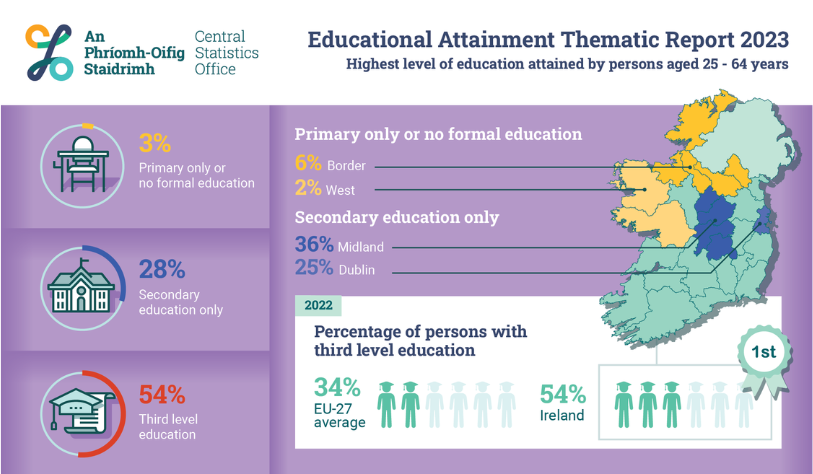Recognition of Prior Learning (RPL)
Recognising the value of non-formal learning
by Dr. Kevin O'Rourke
In Ireland, most recent CSO data show that more than half the population possesses a third-level qualification. And yet, as technology changes and our population ages, the skills gap here and across the European Union is becoming increasingly more apparent. Climate change, the rise of Artificial Intelligence and the ubiquity of data are forcing changes in the workplace that few can keep pace with, and most do not understand the broader, long-term implications. Efforts are being made currently which aim to help workers by focusing primarily on the enhancement of digital and green skills. The EU has done much in recent years to address identified skills gaps by promoting upskilling and reskilling, as well as lifelong learning and learner mobility. In this context, official recommendations are playing a role in shaping the approaches taken by member countries for the development of national systems for the recognition of prior learning (RPL).
Valuing Workplace Learning
Learning happens everywhere, especially in the workplace, and RPL provides a means to formally recognise and accredit skills and knowledge gained through work, study and life experience. It holds significant importance in the twenty-first-century workplace for several reasons. It can be transformative for individuals who may not have engaged significantly in education but who have gained valuable knowledge, skills and competences throughout their work and life experiences. In a rapidly changing workplace, employees often need to acquire new skills or update existing ones to remain competitive. By recognising the skills, knowledge and expertise that people have acquired outside formal education settings, it can help to meet existing and emerging skills needs at a faster pace than traditional, more formal routes.
RPL invites individuals to demonstrate their existing competencies, which can expedite the process of upskilling or reskilling by identifying areas where additional training is necessary and where skills gaps may exist. It thereby enables personalised learning pathways tailored to individual needs and experiences, building on existing knowledge and skills, and resulting in more efficient and relevant learning experiences.
The Value of RPL to individuals and employers
RPL promotes lifelong learning by encouraging individuals to recognise and value their ongoing learning experiences throughout their lives, both formal and informal. When employees feel that their skills and contributions are acknowledged and utilised effectively, they are more likely to remain engaged and committed to their work. In this way RPL also enhances individuals' employability, allowing them to demonstrate their capabilities to potential employers, making them more attractive candidates for job opportunities and career advancement. Disadvantaged groups such as migrants can benefit by the recognition of their existing skills, especially when those skills are in short supply. Similarly, RPL can provide opportunities for individuals from various socio-economic, cultural and educational backgrounds to showcase their abilities and talents, thereby reducing barriers to entry and increasing diversity in the workforce. Individuals with relevant skills can be facilitated in their entry (or re-entry) to the workforce, thus contributing to economic growth and innovation.
The 2021 OECD report The recognition of prior learning in adult basic education discusses the importance of lifelong learning opportunities for all citizens, and highlights the barriers faced by adults, particularly due to time constraints from work and family responsibilities. It suggests that RPL can address these barriers by offering personalised learning pathways and shortening training programmes. And yet, despite various initiatives by the EU, RPL practices remain uneven across Europe. Most systems focus on professional and technical competences, with limited emphasis on general competences necessary for personal development. National regulations exist in many European countries for RPL in adult basic education, but implementation varies greatly. Flexibility is common in how the process is conducted and what tools are used. Guidelines typically cover the identification and documentation of prior learning, with autonomy given to institutions for assessment. Interviews and portfolios are commonly used to identify and document competences acquired in various contexts.
Assessment of Prior Competences
Quality and Qualifications Ireland (QQI) is the national agency responsible for RPL policies in Ireland, but autonomy is granted to education providers to establish their own procedures for identifying and evaluating prior competences. A network of RPL practitioners has been funded under the Human Capital Initiative to foster good practices, facilitate knowledge-sharing activities, raise awareness, and develop a cohesive framework to inform policy development. Its aim is to continue to embed, streamline and promote RPL across the higher education sector, particularly the recognition of non-formal and informal learning, in a manner that is coherent and consistent; to work with employers to increase access and progression opportunities in areas of skills needs; and to enhance the sector’s capacity to operate RPL by developing useful tools, materials, resources and professional development opportunities for staff.
RPL in Ireland primarily emphasizes professional competences and is largely sector-specific (e.g. tourism and healthcare). As elsewhere, procedures are determined locally, distinguishing between the recognition of prior certified learning (RPCL), which pertains to formally accredited learning, and the recognition of prior experiential learning (RPEL), which encompasses competences acquired through non-accredited providers or personal and professional experiences. However, as noted above, RPL is becoming a crucial tool for the twenty-first-century workplace, promoting efficiency, personalised learning, employability, lifelong learning, inclusivity and diversity, while addressing skills shortages and enhancing employee satisfaction and retention. As the nature of work continues to evolve, RPL will play an increasingly vital role in supporting individuals and organisations in adapting to change and thriving in the dynamic global economy.
See here for more information about the National RPL in Higher Education Project.
RPL at Technological University Dublin
At TU Dublin, RPL refers to a formal process used to evaluate and recognise an individual's knowledge, skills and competencies regardless of where or how these were acquired. It aims to assess and acknowledge a person's learning achievements and to provide appropriate credit or recognition for learning achieved in places other than formal classroom settings. Learning which may have been gained through work, life experiences or non-formal education or training can be assessed and recognised for the purpose of entry to programmes, advanced entry, and for credits/exemptions right up to obtaining full higher-education qualifications. And while there are different processes for RPL depending on the purpose for which it is used, all RPL processes require the applicant to provide evidence of appropriate past learning, whether certificated or experiential learning. In some cases it may be sufficient for the applicant to provide copies of appropriate certificates. In other cases there will be a self-assessment exercise, preparation of a file or ‘portfolio’ of appropriate evidence of learning, an interview, and perhaps a demonstration or assessment task.
See here for more information about RPL at TU Dublin.
The Enterprise Academy at TU Dublin seeks to assist the university in its strategic objective to widen access to higher education by ensuring that the value of prior learning and experience is recognised and valued. In this way it can support the needs of enterprise and employers in respect of staff development and upskilling.
RPL in Action TU Dublin / Screen Ireland
In the summer of 2022, The Screen Guilds of Ireland launched their competency framework. This world first for the screen industry, which took three years to develop, mapped out the skills, competencies and progression through grades for crew across over 20 guilds within the industry.
The Enterprise Academy, working with the School of Media and its partner Screen Ireland began a consultation process to determine how RPL might benefit employees in the screen sector. Following an in-depth national survey, it was discovered that over 30% of crew across many departments don't have major academic qualifications restricting their ability to access further education and develop their career options. There is a long-standing culture and practice of work-based learning within the Screen Sector which must be preserved and respected.
The current proposal suggests that a BA in Screen Industry Practice would be most appropriate. Eligible candidates would apply to enter a bespoke (18-month part time programme) with RPL applied up to a Level 7. In this programme they would gain the skills and knowledge to be able to reflect on their career. The school has experience of developing similar programmes. In the past a similar pogramme, BA in journalism, was offered to experienced journalists who found themselves in the same situation, without a major degree. The proposal is under consideration and a validation event is expected later this Spring.
See here for more information about RPL at TU Dublin.
About the author
Kevin C. O'Rourke has worked at Technological University Dublin (formerly Dublin Institute of Technology) in a variety of positions over the past two decades, including roles in project management, as Head of eLearning Support & Development, as Digital Campus Architect and currently as Enterprise Partnership Lead with the Enterprise Academy. He worked on secondment with Ireland’s National Forum for the Enhancement of Teaching and Learning to produce the Digital Roadmap for Higher Education (2015–17) and the review of Ireland’s Higher Education Digital Infrastructure (2017). Prior to joining DIT he worked for Columbia University’s Fathom.com, and his professional career spanned advertising and publishing in Dublin, New York and London. He holds a PhD in the history of ideas from University College London, as well as bachelor and masters degrees in philosophy from University College Dublin.






